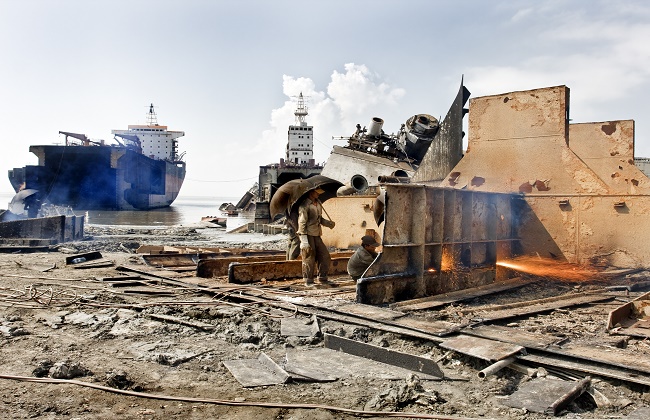
The shipbreaking industry started its cruel journey in 1960 when most environmentalists, NGOs and news organisations had no clue to understand the fathom of the brutal impact on the environment, human health, agriculture and the burden on healthcare management.
In addition to its human impact, the shipbreaking industry in Chattogram is destroying environmental ecosystems in SitakundaBeach.
The ship scrapping industry is a dirty and dangerous economic activity amid poor transparency and inadequate monitoring systems by the authorities.
When ships come to the Chattogram graveyard, the worker’s casualties including death and injuries are ignored by the shipbreaking owners.
The presence of Polychlorinated Biphenyls (PCB), engine oil, spent fuel, and asbestos concentrations at ship recycling yards on the beaches of Chattogram are at alarming levels. The industry in Bangladesh is highly dangerous and unregulated.
Most gigantic vessels are imported to Bangladesh with false documents, claiming the vessel is asbestos-free. The powerful shipbreaking industry, which generates more than half of Bangladesh’s raw steel supply, has had a devastating impact on workers’ lives and the environment, and European shipowners are frequently shamed for sending their vessels to Bangladesh for demolition with no respite.
They ought to know that their vessels contain numerous toxic materials, including asbestos, and that the conditions at the shipbreaking yards in Bangladesh are appalling. This exploitation of poor coastal communities is for the financial benefit of an already wealthy shipping industry.
End-of-life ships are considered toxic waste under the Basel Convention because they are full of toxic materials: asbestos is used as insulation; heavy metals like cadmium, lead, and chromium are in paints and coatings for batteries, motors, generators, and cables; mercury is in thermometers, electrical switches, lights, and often in vessels that have operated in the oil and gas extraction sector; oils, fuel, harmful bacteria, and toxic sludge are found in bilge water, sewage, and ballast water.
Every day, the huge cargo ships are taken apart by hand by unskilled labourers recruited from poverty-stricken villages in the north of the country. The labourers do not comply with work safety guidelines, which are not strictly enforced. Nor do labour laws are enforced.
Hundreds of workers are wounded and maimed. None of them received adequate compensation. The wounded and maimed workers have never been provided proper medical care and do not speak about rehabilitation.
There is a strong fluctuation of workers between the yards as most are employed on day wages and often return to their villages during the harvest season.
They work long gruelling hours without holidays, and trade unions are prevented from effectively organising them. When workers attempt to unionise or protest conditions, they are fired, harassed and intimidated.
In 2018, the Brussels-based NGO Shipbreaking Platform documented at least workers who were killed and at least 10 who suffered severe injuries while breaking the massive ships that are beached in Sitakundu.
The causes of death at the shipbreaking yards are many, including suffocation, explosions, falling from great heights and crushing due to falling parts of the ship.
Dozens of workers in the Bangladesh yards have died in recent years and years according to local NGOs and media, but more still will suffer early deaths from their exposure to asbestos pollution.
The workers are fighting for their rights because they do not receive official minimum wages, and do not have access to health facilities or bear the costs of their treatments.
The hospital building set up by the Bangladesh Shipbreakers Association (BSBA) is operated as a private clinic and can only treat minor injuries. Many workers succumb to their injuries on their way to the closest specialised government hospital in Chattogram city. Moreover, the injured workers do not automatically receive financial support for necessary medical treatment.
Multinational shipping firms appear to have distanced themselves from these deaths in part by selling their end-of-life vessels to so-called cash buyers, many of them based offshore where their ownership is kept secret. These companies specialise in sending ships to scrap but also provide a firewall between the yards and PR-conscious shipowners.
As a result of working in hazardous conditions, shipbreaking workers are more likely to suffer accidents. These accidents are rarely officially reported due to the lack of transparency on the part of employers and the government.
Accidents are commonly caused by fire and explosions, falling of heavy objects, electrocution, falls from height as well as mental and physical stress and fatigue.
Other significant factors that contribute to the high accident rate are the lack of safety and health training, poor work organisation, inadequate housing and sanitation, inadequate emergency, first-aid and rescue facilities, lack of medical facilities and social protection.
Workers described injuries from falling chunks of steel or being trapped inside a ship when it caught fire or pipes exploded. Lack of accessible emergency medical care at shipyards meant that, in many cases, workers were forced to carry their injured co-workers from the beach to the road and find public transport willing to take the victim to a state-run medical hospital in Chattogram.
The absence of occupational health and safety practices, systemic labour rights violations, and a lack of transparency from the industry further compound the problems associated with shipbreaking in South Asia.
Workers consistently said that they are not provided with adequate protective equipment, training, or tools to safely do their jobs. Workers described using their socks as gloves to avoid burning their hands as they cut through molten steel, wrapping their shirts around their mouths to avoid inhaling toxic fumes and carrying chunks of steel barefoot.
According to the ILO Guidelines of 2009, “training should be provided to all participants at no cost and should take place during working hours”.
As per the Ship Recycling Rules 2011, “no person shall be allowed to be employed in a shipbreaking yard without appropriate training certificate”. Besides not having appropriate training and PPE to correctly perform such dangerous procedures, the workers do not receive a working contract or letter of appointment. Hence, none of the workers have any social security and adequate access to healthcare and compensation packages.
The shipbreaking company’s human resource management officials cleverly collect more than 10 signatures on blank papers and take pictures of the workers but no contract papers are given to the workers. When the workers suffer accidents, the treatment is sometimes either partially or paid, which is rare, depending on the company’s unwritten policy.
However, most of the time the workers do not receive any compensation even if they are not able to work anymore due to their injuries, like amputation of limbs or other life-threatening injuries.
By the 2011 Shipbreaking and Recycling Rules, after an accident, a yard is supposed to immediately suspend operations for a week but this has not always happened.
The additional stress on inadequate medical facilities with a shoestring budget of the government hospitals.
Despite laws existing in Bangladesh to protect both workers and the environment, these are poorly implemented due to the weak enforcement capacity of the both Department of Environment and the Department of Labour and are deliberately ignored as a result of political pressure.
Most of the end-of-life vessels are imported with fake certificates claiming that they are free of hazardous materials. As a consequence, toxins are not properly detected and safely removed.
The environmental laws and guidelines are regularly flouted by the shipbreaking owners who have political clouts, supervisors and private buyers for illegal markets who also work as the yard’s henchmen.
Even after providing healthcare support to workers in the shipbreaking yard, more workers report to hospitals for treatment. Besides diagnosis, the workers have to buy medicine for a full recovery. The labourers diagnosed with asbestos contamination become too weak to work in the yard. They are fired for ill health with little or no compensation.
The president of the Bangladesh Ship Breakers and Recyclers Association Abu Taher is in denial mode of large-scale asbestos poisoning among ship-breaking workers. There is no asbestos victim in the industry, as the ships built after 2000 do not carry any asbestos.
“It has been a conspiracy to shut down the prospective ship-breaking industry in Bangladesh,” he accused the media and NGOs of spreading rumours against the industry.
The European Union (EU) Ship Recycling Regulation (SRR) only applies to ships flagged by an EU state, which allows companies to avoid the EU requirements by transferring a ship’s flag to a different state, known as a “flag of convenience.”
Shipbreaking in Bangladesh is strongly criticised by both international and local NGOs due to its dirty and dangerous practices. Concerns include abysmal working conditions, fatal accidents, exploitation of child workers, and severe pollution of the marine environment as well as the dumping of hazardous wastes.
RECOMMENDATIONS:
- International compliance must be implemented by the shipbreaking industry, like other export-oriented factories;
- The shipbreaking industry must be transparent and accountable to government laws and guidelines;
- The Basel Convention and Hong Kong Convention must be strictly implemented by the countries where unregulated shipbreaking and recycling is rampant;
- Shipping companies should invest in building standard platform facilities that fully protect workers’ rights and handle waste disposal;
- The shipbreaking industry should be environment friendly, sustainable, safety and security compliance.
Saleem Samad is an award-winning independent journalist and a media rights defender with the Reporters Without Borders. Recipient of Ashoka Fellowship and Hellman-Hammett Award. He could be reached at saleemsamad@hotmail.com; Twitter (X): @saleemsamad

